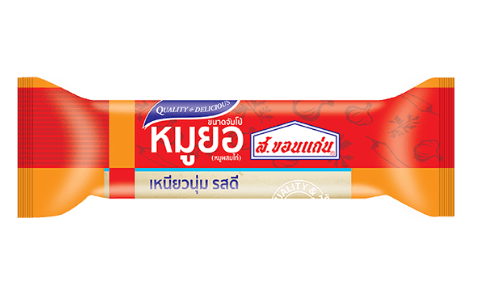
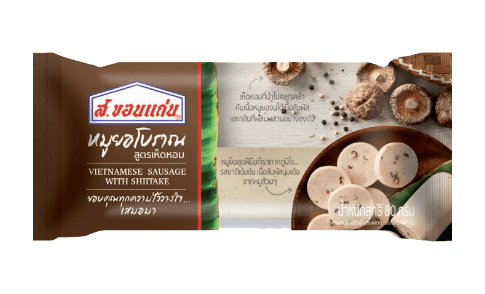
This has always been the primary and principal group of products of the Company. It is counted as the largest proportion of the total sales turnover, with the use of both Bang Phli and Nakhon Pathom Factories as production bases.
Thai native foods comprise of fermented sausages, Vietnamese sausages, Northeastern (Isan) sausages, pork balls, shredded pork, crispy pork, Chinese sausages, and others manufactured under the brands “ S. Khonkaen ”, “ Moodee ”, “ Huaykaew ”, “ Baanphai ”, “ Moo Champ ” and “ Setthi” etc.
The development of the group of food products processed from meat in 2019 focused mostly on internal improvements of quality and efficiency as well as of new formulas that help enhance production quality and efficiency.
Main channels of distributions were still the modern trade channel, convenience stores, tourist markets and exportation, with the Company taking action as the direct distributor, whereas for the fresh food market (traditional trade) channel distributions were carried out by Mahachai Foods Co., Ltd., which is an affiliate.
The group of Thai native food products in 2019, such as, traditional Vietnamese sausages (classic flavor) and high quality Vietnamese sausages (coarse cut) and fermented sausages “ Huay Kaeo ” brand, which had received good feedback from consumers, was, in an overall picture, still growing continuously through the development of principal products and the expansion of the distribution channels.
As to cost and pricing, this group of products was a principal one affected by prices of raw material, i.e. pork, which had increased by more than 25 percent against those of the previous year. Despite a considerable increase in the cost, the Company was not able to adjust its prices accordingly because the national economic conditions were still in a slowdown time, the purchasing power of consumers decreased and the competition grew higher in terms of both direct competitors and indirect competitors with substitute products.

Processed seafood is another core business of the Company, the sales turnover rank second subsequent to the Thai native foods. The products are processed by Mahachai Foods Company Limited (existing name : Mahachai Food Processing Company Limited), subsidiary and distributed the products through Traditional Trade and Modern Trade; and foreign markets via importers abroad. The main importer countries include the United States of America, countries in the European Community, the United Kingdom, Israel, Japan, Korea and Hong Kong.
The processed seafood comprises fish balls, shrimp balls and squid balls. The products are graded according to quality to penetrate upper and lower markets. At present, the processed seafood of Mahachai Foods Company Limited comprises both products manufactured under the Company’s own brands and OEM products. The processed seafood of the Company is produced under the brands “ Taechiew ”, “ Kwangchow ”, “ Kowloon ”, “ Mahachai ”, “ Odeng ”, “ Shanghai ”, “ Kaizen ”, “ Hong Kong ”, “ Taipei ” and others OEM products.
In addition, chili pastes and dips are included in the seafood production line under the Company’s brands “ Thai Doem ” and “ Thai Niyom ”.
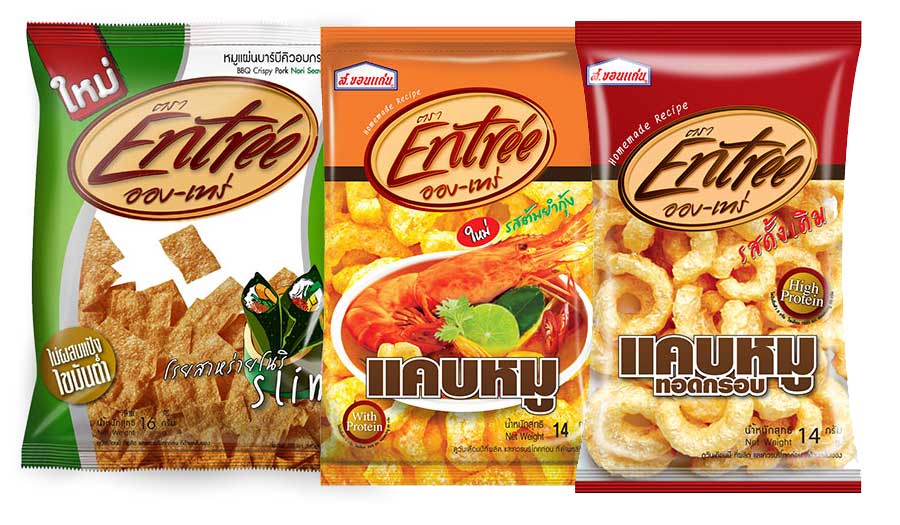
The distribution of the group of pork and chicken snack products, which is marketed under “Entreé” and “S. Khonkaen” brands and comprises roasted pork crisps, seasoned roasted pork and pork cracklings, is directly managed by the Company via the convenience store channel, whereas for the modern trade and traditional trade channels DKSH (Thailand) Co., Ltd. remains the sole distributor.

In the past year, the company’s policy is to change from contract manufacturing under the customer brand (OEM) to develop products under their own brands such as “ S. Khonkaen ” sticky rice with Crispy Flossy Pork with Fried Shallot that is mainly sold via convenience stores, and Yunnan pork leg through its own stores and Modern Trade and this will continuously expand to offer more alternative mean for consumers.
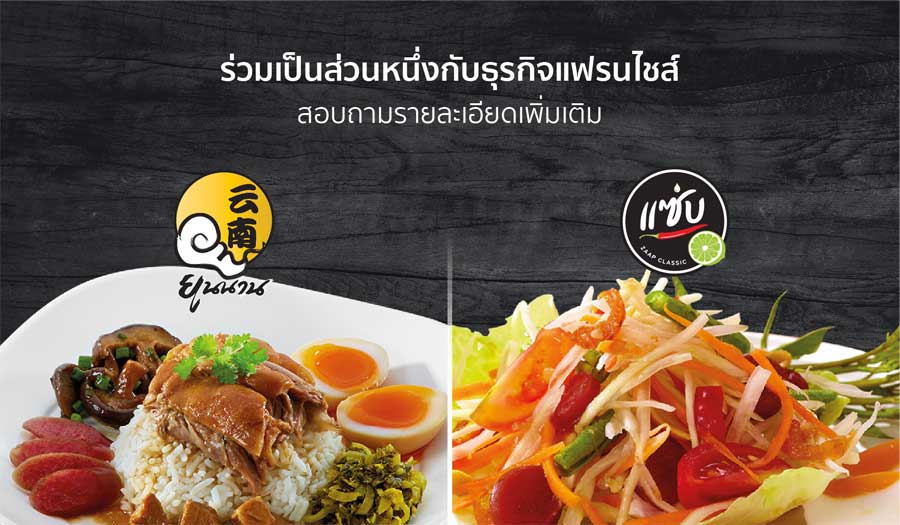
Quick Service Restaurant, the Company has operated chain restaurants selling papaya salad (Somtam) and roasted chicken under the brand “ Zaap Classic ” in the mode of company operate and franchising, totaling 12 outlets in 2019. In this year, the Company has introduced delivery service in the mode of call center and website of the company, and delivery to various platforms such as Lineman, Grab, Food Panda and some by company’s staff and also boxed food for outdoor catering including office outlet.
For stewed pork leg with rice branded “ Yunnan ”, there are totally 17 outlets in 2019 and the policy has been turned more to franchise system but still the main dish is pork leg base i.e. rice with pork leg and basil or the menu of pork leg and bun which is well response by consumer. In this year, the Company focus on efficiency management domestically.
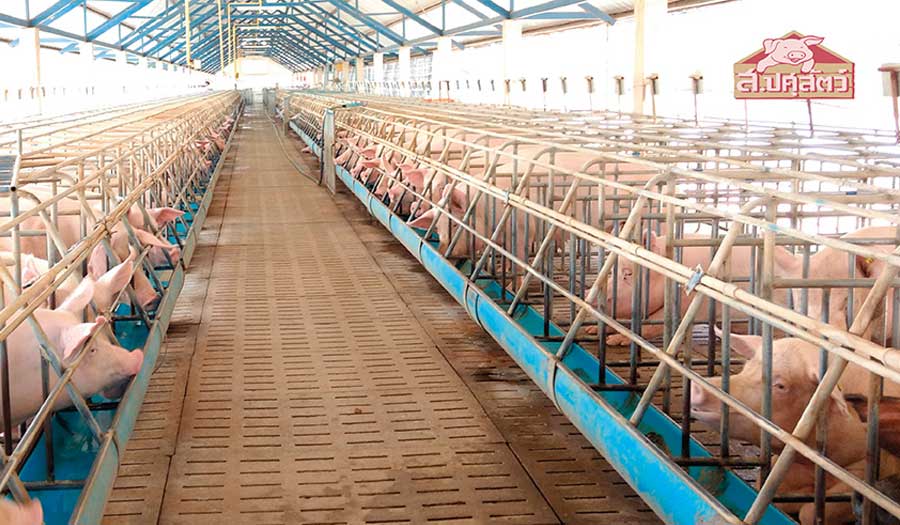
S. Pasusat Co., Ltd. conducts the business of breeding pig and swine. At present, the Company mainly distributes raised pigs. The Company attaches utmost importance to the maintenance of product quality, that is, the quality of pig carcass, which contains low fat but much red meat, thereby meeting the requirements of consumers. Moreover, the Company has taken steps to improve the pig breeds regularly to ensure that it will be able to maintain the quality of pig carcass continuously
The Company therefore attaches importance to the search for a way to reduce its cost continuously, such as, the use of an automatic feeding system to replace labor for the feeding of animals in pig raising facilities, because the lack of labor tends to grow higher and will affect the pig raising cost, which will rise significantly. In addition, the Company has focused more on quantitative productions, that is, the reproduction of more piglets per litter so as to enable the Company to manage its cost to an appropriate level and to make more profits in the interval of a rise in the raised pig price and at the same time there will be a smaller chance of loss when the raised pig price has decreased.
Furthermore, the pig farm business is deemed to be one that provides raw material security for the Company. In this regard, in 2019 the Company anticipated that the raised pig price would on average increase throughout the year. But there might be some intervals in which the price did not increase because pig raiser groups worried about a disease, that is, the African swine fever, and gradually sold pigs into markets in excess of the market demand. Therefore, this was the principal cause that prevented the pig prices from moving up significantly during the third quarter of Year 2019 that has passed.
However, the Company formulated measures to prevent diseases from entering the farms. One of the most important measures was the raising of the biosecurity level, for example, outside people who are not related are prohibited from entering the farm area. In addition, the Company has planned to increase its production capacity from 3,000 sows to 5,000 sows in 2020 and 2021.

